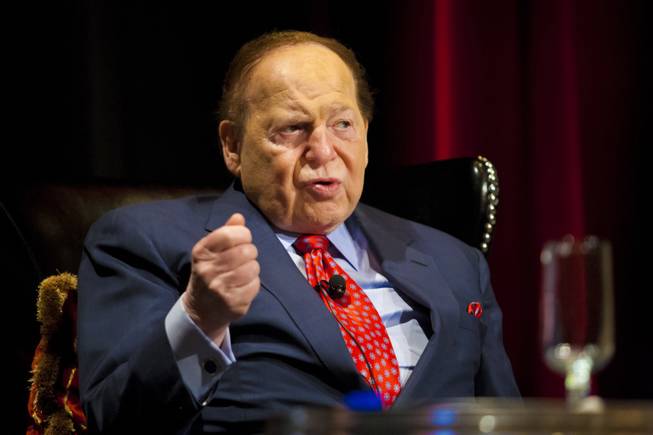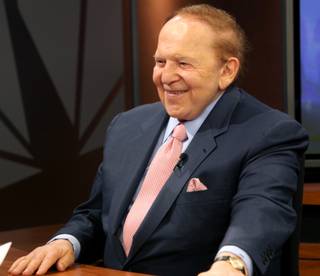
Las Vegas Sands CEO and Chairman Sheldon Adelson, shown in this April 26, 2012, file photo, is backing a Republican group trying to persuade Jewish voters in battleground states to support presidential candidate Mitt Romney.
Wednesday, July 25, 2012 | 12:10 p.m.
Sun coverage
WASHINGTON — A Republican group backed by Las Vegas casino magnate Sheldon Adelson is starting an effort in battleground states to win over Jewish voters who could be persuaded to turn away from President Barack Obama and support Mitt Romney.
The group, the Republican Jewish Coalition, plans to begin a multimillion-dollar advertising campaign in the coming weeks called “My Buyer’s Remorse,” targeting voters in Florida, Ohio and Pennsylvania, aides said. The campaign uses testimonials from people who say they regret supporting Obama because of his economic policies and his posture toward Israel, in hopes of cutting into the wide advantage Democrats have held over Republicans among Jewish voters.
It is the latest foray into the election by Adelson, a staunch supporter of Israel who has vowed to spend as much as $100 million to defeat Obama. It is an escalation of partisan politics over Middle East policy and represents an emerging Republican strategy of highlighting voters who supported Obama four years ago but are now expressing disappointment, while signaling to others that they are not alone in shifting their allegiances.
The intensified pursuit of Jewish voters is coming into sharper view as Romney is on a trip that will take him to Israel this weekend. It is a closely watched visit, especially given the often-tense relations between Obama and Prime Minister Benjamin Netanyahu of Israel, who has known Romney for three decades.
Adelson has emerged as potentially the largest single donor in U.S. politics this year. After initially backing Newt Gingrich in the Republican primary race, Adelson eased his skepticism of Romney, and his support has steadily grown.
In May, Adelson and Romney met privately in Las Vegas, and aides said the two men have communicated occasionally since then. In June, Adelson and his wife each gave $5 million to a pro-Romney super PAC. His support for Israel aligns him with other influential Republican constituencies, including evangelical Christians, who see Obama as failing to support Israel sufficiently.
The fight for the Jewish vote is more of a hunt-and-peck search for disgruntled voters, considering that Obama won more than 70 percent of votes among Jews in 2008, according to exit polls. But with an estimated 600,000 Jewish voters in Florida, a critical swing state, Democratic leaders said they were not taking the constituency for granted, and they acknowledged a need to increase enthusiasm among Jews before November.
“They figure if they shave off a few points here and a few points there in the Jewish population through lying and distortions, they can win,” said Rep. Debbie Wasserman Schultz of Florida, chairwoman of the Democratic National Committee. “But they can’t dress themselves up to be something appealing to the Jewish community when they aren’t.”
The Republican Jewish Coalition, the party’s leading outreach group for Jewish voters, has spent months developing a campaign to find like-minded voters in Florida, Ohio and Pennsylvania, the three swing states with the largest Jewish populations. It is the most extensive electoral effort undertaken by the group, which is financed by Adelson and other members of the group’s board, who have pledged at least $6.5 million to build a comprehensive list of Jewish voters and to wage a word-of-mouth campaign, amplified through social media and television advertising.
“We don’t need to get a majority of the vote to win,” said Matt Brooks, executive director of the Republican Jewish Coalition. “When we take votes away from Democrats, we are taking votes from a key part of their constituency.”
A Gallup poll of voters from June 1 to July 22 showed that Obama led Romney among Jewish voters 67 percent to 25 percent. They said they strongly supported liberal issues that traditionally align with Democrats, including abortion rights, same-sex marriage and an overhaul of immigration laws.
But if Romney won 25 percent of the Jewish vote, it would be the best showing by a Republican candidate in more than two decades, which could be especially important in swing states, where the margin of victory could be narrow. Four years ago, Sen. John McCain won about 21 percent of the Jewish vote.
The advertising campaign features a testimonial from Michael Goldstein, 48, a community college administrator from New Jersey, who said he enthusiastically supported Obama’s candidacy but became disillusioned by his administration. A lifelong Democrat, he said he was planning to support Romney by casting his first vote for a Republican in a presidential race.
“I was enamored with Obama,” Goldstein said in an interview. “I thought he was sharp, intelligent and brought a new sense of wonder to politics. The fact that we were helping elect the first African-American president of the United States made me very proud, but I don’t believe anything he says anymore. I go more by his actions than by what he says.”
Goldstein said he gradually became disenchanted with Obama when his promises to change Washington did not come to pass. He said he was particularly incensed by the administration’s stance toward Israel, particularly the president’s view that the 1967 borders should be a starting point for negotiations for a two-state peace solution. He said he also believed that Obama showed disrespect to Netanyahu.
It remains an open question how many voters share the views of Goldstein, who conceded that some of his frustrations at Obama were also a result of what he saw as the president’s failure to uphold liberal principles on gun control and some social issues. But he said that his discontent was strong enough that he would cast a vote for Romney and that he intended to campaign aggressively in Pennsylvania.
“It doesn’t take a lot of buyer’s remorse to potentially shift the outcome,” said Ari Fleischer, a member of the Republican Jewish Coalition’s board and a former press secretary to President George W. Bush.
While the Obama campaign and the Democratic Party have increased their outreach, leaders of several Jewish organizations dismissed the possibility that Republicans could make significant inroads in the November election.
“There is a very large chunk of the Jewish community that is very Democratic that can’t be eaten into,” said Mik Moore, founder of the Jewish Council for Education and Research. “There is a fight for maybe 10-15 percent, but nobody is underestimating the impact that the massive independent spending can have on the campaign.”
Jeremy Ben-Ami, the president of J Street, a Jewish lobbying group in Washington that favors Democratic candidates, said the effort by Adelson and the Republican Jewish Coalition would fall short.
“Every single number indicates there is simply no such thing as a Jewish problem for the president,” Ben-Ami said. “The people who vote only on Israel didn’t vote for Obama last time and know who they are voting for already.”


Join the Discussion:
Check this out for a full explanation of our conversion to the LiveFyre commenting system and instructions on how to sign up for an account.
Full comments policy